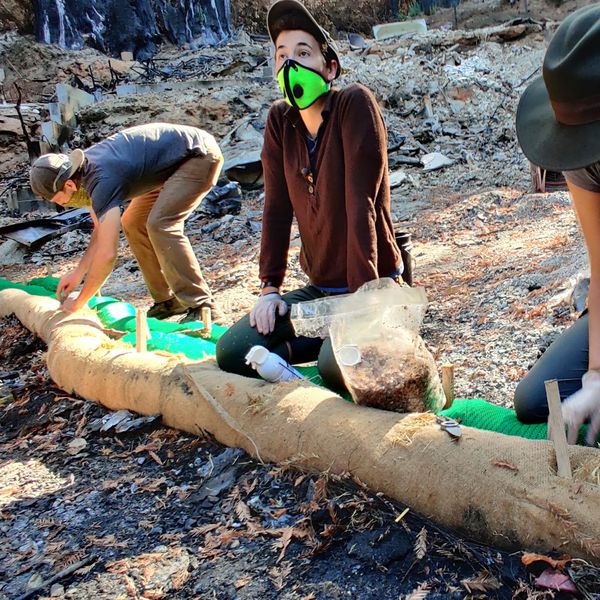Editor's note: This story is part of "Breathless," EHN's in-depth look at asthma in Pittsburgh and what can be done to help children breathe easier.
PITTSBURGH—It's something of an open secret that people who live in Allegheny County, Pennsylvania, face a substantially higher risk of developing asthma than the national average, and that we're in the top 2 percent of the U.S. for cancers associated with air pollution.
But there's another, lesser-known risk that's also been linked with the types of air pollution that are a problem in the region: Autoimmune disease.
Autoimmune disease refers to a group of more than 100 inflammatory diseases involving the immune system attacking healthy cells in the body, such as Crohn's and celiac disease, lupus, Hashimoto's thyroiditis, multiple sclerosis and type 1 diabetes. Autoimmune diseases have been steadily on the rise in the U.S. and globally for the last 30 years.
An estimated 23.5 million Americans have some form of autoimmune disease, according to federal estimates. However, some health organizations, such as the American Autoimmune Related Disease Association, say that number could be more than double because federal data doesn't include all possible autoimmune diseases.
The diseases are a leading cause of morbidity among middle-aged women, and the second-leading cause of chronic illness in the nation.
"Normally our immune systems know not to attack us," Dr. Susan Manzi, director of the Lupus Center of Excellence at the Allegheny Health Network's Autoimmunity Institute, explains. "They attack things that are foreign or don't belong, like bacteria or viruses or foreign small particulates. But sometimes when the system is revving up to get rid of them, in certain people with the right genetic background, that turn-up of the immune system never gets shut off. It becomes overactive, and starts to recognize the cells it's supposed to be protecting as foreign."
Although asthma has many triggers, some research suggests that the disease is also the result of a malfunctioning immune system, which results in inflammation of the airways. A number of researchers have called for further exploration of the links between the two, and suggested that the same environmental causes could trigger the immune system dysfunctions involved in both asthma and autoimmune disorders.
When it opened in February, the Allegheny Health Network's Autoimmunity Institute became the first medical center in the world to put multiple specialists under one roof to treat autoimmune patients collaboratively while conducting multidisciplinary research into autoimmune diseases, since they often impact more than one bodily system simultaneously. The institute has nine specialists on staff, including an allergist who treats asthma.

Smokestacks of US Steel's Clairton Coke Works are visible behind a row of homes in Clairton, PA. (Connor Mulvaney/EHN)
Manzi acknowledges that there's not yet enough research on that topic to officially designate asthma an autoimmune disorder. "But," she adds, "I think a lot of people would say that many autoimmune diseases have environmental triggers, and asthma would not be distinct from that."
While we know asthma rates in Allegheny County are higher than average, there's a lack of data available on the overall prevalence of autoimmune disease, (mostly due to to the sheer number of them) which makes it difficult to compare rates between regions. Manzi doesn't have statistics on which autoimmune diseases are most prevalent in Pittsburgh, but based on her observations, she says the institute most commonly treats patients with inflammatory bowel disease, Crohn's disease, celiac disease, ulcerative colitis, autoimmune thyroid disease, rheumatoid arthritis and multiple sclerosis.
We do know that Allegheny County has higher than average mortality rates for at least one autoimmune disorder: From the years 2000 through 2008, the age-adjusted death rate for multiple sclerosis in Allegheny County exceeded the state average by 40 percent, according to state Department of Health mortality data.
"There have been a lot of studies looking at whether areas that have higher concentrations of small particle pollutants have higher risk of autoimmune disease, or at least higher risk of ones that are under poor control," Manzi says. "There's been some data to support that beyond asthma, which we know can be triggered by air pollution, a number of autoimmune diseases, like rheumatoid arthritis and lupus, have been linked to these particles in the air."
Scientists have documented numerous links between autoimmune diseases and exposure to various forms of air pollution. In particular, research shows that exposure to particulate matter pollution—which Allegheny ranks 10th worst in the nation for—can worsen existing cases of autoimmune diseases like lupus, neuroinflammatory disease, and type 1 diabetes, and in some cases may even be a trigger for the onset of disease.
Related: 60% of Pittsburgh kids with asthma don't have their disease under control
As an example, Manzi pointed to a 2009 study that found people who lived near high-traffic roadways face greater risk of developing rheumatoid arthritis. Traffic-related pollution worsens ozone pollution levels. In addition to particulate matter pollution, ozone was one of the categories that Allegheny County received an "F" grade for in the American Lung Association's 2018 State of the Air report.
Numerous studies have also shown that elevated levels of particulate matter pollution lead to spikes in ER visits for asthma and other acute heart and respiratory illnesses, as well an increase in deaths related to those diseases. A recent study in Allegheny County found that in the year after one of Pittsburgh's biggest polluters shut down, ER visits for asthma and chronic obstructive pulmonary disease (COPD) dropped by 38 percent.
Exposure to air pollution has also been shown to worsen disease activity in people who already have an autoimmune disease. A 2011 Canadian study linked high levels of particulate matter pollution with lupus flare-ups. The researchers monitored 237 patients over seven years, while simultaneously measuring the air quality in their surrounding environments. After adjusting for certain climate factors and for race, ethnicity and gender, they found a direct correlation between spikes in particulate matter pollution and spikes in disease activity, both in patients' reported symptoms and in their lab tests.
A similar study out of Brazil in 2016 looked at the impact of air pollution on children with lupus. Those researchers also observed spikes in disease activity that coincided with spikes in particulate matter pollution, and noted a significant increase in inflammation of the children's airways when pollution levels were high.
"Our findings have shown that air pollution doesn't just increase the incidence and prevalence of chronic lung disease and acute respiratory infections, lung cancer, heart disease and strokes, it is also an important contributory factor in childhood rheumatic diseases, such as lupus," Dr. Maria Fernanda Goulart, a co-author of the study from the University of São Paulo, said in a press release at the time.
A more recent Canadian study, conducted in 2014, concluded that particulate matter pollution could both trigger and accelerate the development of gastrointestinal autoimmune diseases like Crohn's, ulcerative colitis, and inflammatory bowel disease.
Dr. Sally Wenzel, director of the Asthma Institute at the University of Pittsburgh Medical Center, says Pittsburgh would be an ideal place for further study on the links between air pollution, asthma, and autoimmune disease.
"Autoimmune disorders are inflammatory diseases just like asthma," Wenzel tells EHN. "And yet the data on how environment and location relate to autoimmune disease is much more lacking than it is for asthma.
"There's a lot of evidence now that what you breathe may impact your lungs in many ways, and could actually start an autoimmune process. That's a link we haven't fully explored in this region yet."


























